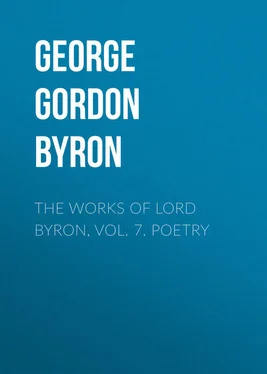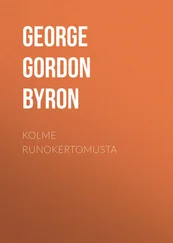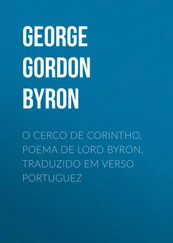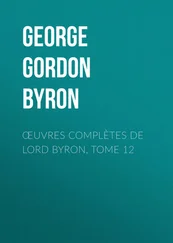George Gordon Byron - The Works of Lord Byron, Vol. 7. Poetry
Здесь есть возможность читать онлайн «George Gordon Byron - The Works of Lord Byron, Vol. 7. Poetry» — ознакомительный отрывок электронной книги совершенно бесплатно, а после прочтения отрывка купить полную версию. В некоторых случаях можно слушать аудио, скачать через торрент в формате fb2 и присутствует краткое содержание. ISBN: , Жанр: foreign_antique, foreign_prose, foreign_poetry, на английском языке. Описание произведения, (предисловие) а так же отзывы посетителей доступны на портале библиотеки ЛибКат.
- Название:The Works of Lord Byron, Vol. 7. Poetry
- Автор:
- Жанр:
- Год:неизвестен
- ISBN:http://www.gutenberg.org/ebooks/27577
- Рейтинг книги:5 / 5. Голосов: 1
-
Избранное:Добавить в избранное
- Отзывы:
-
Ваша оценка:
- 100
- 1
- 2
- 3
- 4
- 5
The Works of Lord Byron, Vol. 7. Poetry: краткое содержание, описание и аннотация
Предлагаем к чтению аннотацию, описание, краткое содержание или предисловие (зависит от того, что написал сам автор книги «The Works of Lord Byron, Vol. 7. Poetry»). Если вы не нашли необходимую информацию о книге — напишите в комментариях, мы постараемся отыскать её.
The Works of Lord Byron, Vol. 7. Poetry — читать онлайн ознакомительный отрывок
Ниже представлен текст книги, разбитый по страницам. Система сохранения места последней прочитанной страницы, позволяет с удобством читать онлайн бесплатно книгу «The Works of Lord Byron, Vol. 7. Poetry», без необходимости каждый раз заново искать на чём Вы остановились. Поставьте закладку, и сможете в любой момент перейти на страницу, на которой закончили чтение.
Интервал:
Закладка:
The sacred song that on mine ear
Yet vibrates from that voice of thine,
I heard, before, from one so dear —
'T is strange it still appears divine.
But, oh! so sweet that look and tone
To her and thee alike is given;
It seemed as if for me alone
That both had been recalled from Heaven!
And though I never can redeem
The vision thus endeared to me;
I scarcely can regret my dream,
When realised again by thee.
[LA REVANCHE.]
There is no more for me to hope,
There is no more for thee to fear;
And, if I give my Sorrow scope,
That Sorrow thou shalt never hear.
Why did I hold thy love so dear?
Why shed for such a heart one tear?
Let deep and dreary silence be
My only memory of thee!
When all are fled who flatter now,
Save thoughts which will not flatter then;
And thou recall'st the broken vow
To him who must not love again —
Each hour of now forgotten years
Thou, then, shalt number with thy tears;
And every drop of grief shall be
A vain remembrancer of me!
TO THOMAS MOORE.
WRITTEN THE EVENING BEFORE HIS VISIT TO MR. LEIGH HUNT IN HORSEMONGER LANE GAOL, MAY 19, 1813
Oh you, who in all names can tickle the town,
Anacreon, Tom Little, Tom Moore, or Tom Brown, — 26 26 [Moore's " Intercepted Letters; or, The Twopenny Post-Bag , By Thomas Brown, the Younger," was published in 1813.]
For hang me if I know of which you may most brag,
Your Quarto two-pounds, or your Two-penny Post Bag;
But now to my letter – to yours 'tis an answer —
To-morrow be with me, as soon as you can, sir,
All ready and dressed for proceeding to spunge on
(According to compact) the wit in the dungeon — 27 27 [James Henry Leigh Hunt (1784-1859) was imprisoned February, 1813, to February, 1815, for a libel on the Prince Regent, published in the Examiner , March 12, 1812. — Letters , 1898, ii. 205-208, note 1.]
Pray Phoebus at length our political malice
May not get us lodgings within the same palace!
I suppose that to-night you're engaged with some codgers,
And for Sotheby's Blues 28 28 [For "Sotheby's Blues," see Introduction to The Blues, Poetical Works , 1901, iv. 570, et ibid ., 579, 580.]
have deserted Sam Rogers;
And I, though with cold I have nearly my death got,
Must put on my breeches, and wait on the Heathcote; 29 29 [Katherine Sophia Manners was married in 1793 to Sir Gilbert Heathcote. See Letters , 1898, ii. 402, 406.]
But to-morrow, at four, we will both play the Scurra ,
And you'll be Catullus, the Regent Mamurra. 30 30 [See Catullus , xxix. 1-4 — "Quis hoc potest videre? quis potest pati, Nisi impudicus et vorax et aleo, Mamurram habere, quod Comata Gallia Habebat uncti et ultima Britannia?" etc.]
ON LORD THURLOW'S POEMS. 31 31 [One evening, in the late spring or early summer of 1813, Byron and Moore supped on bread and cheese with Rogers. Their host had just received from Lord Thurlow [Edward Hovell Thurlow, 1781-1829] a copy of his Poems on Several Occasions (1813), and Byron lighted upon some lines to Rogers, "On the Poem of Mr. Rogers, entitled 'An Epistle to a Friend.'" The first stanza ran thus — "When Rogers o'er this labour bent, Their purest fire the Muses lent, T' illustrate this sweet argument." "Byron," says Moore, "undertook to read it aloud; – but he found it impossible to get beyond the first two words. Our laughter had now increased to such a pitch that nothing could restrain it. Two or three times he began; but no sooner had the words 'When Rogers' passed his lips, than our fit burst forth afresh, – till even Mr. Rogers himself … found it impossible not to join us. A day or two after, Lord Byron sent me the following: – 'My dear Moore, "When Rogers" must not see the enclosed, which I send for your perusal.'" — Life , p. 181; Letters , 1898, ii. 211-213, note 1.] Thurlow's poems are by no means contemptible. A sonnet, "To a Bird, that haunted the Water of Lacken, in the Winter," which Charles Lamb transcribed in one of Coleridge's note-books, should be set over against the absurd lines, "On the Poems of Mr. Rogers." "O melancholy bird, a winter's day Thou standest by the margin of the pool; And, taught by God, dost thy whole being school To Patience, which all evil can allay: God has appointed thee the fish thy prey; And giv'n thyself a lesson to the fool Unthrifty, to submit to moral rule, And his unthinking course by thee to weigh. There need not schools nor the professor's chair, Though these be good, true wisdom to impart; He, who has not enough for these to spare Of time, or gold, may yet amend his heart, And teach his soul by brooks and rivers fair, Nature is always wise in every part." Select Poems , 1821, p. 90. [See "Fragments of Criticism," Works of Charles Lamb , 1903, iii. 284.]
When Thurlow this damned nonsense sent,
(I hope I am not violent)
Nor men nor gods knew what he meant.
And since not even our Rogers' praise
To common sense his thoughts could raise —
Why would they let him print his lays?
To me, divine Apollo, grant – O!
Hermilda's 32 32 [ Hermilda in Palestine was published in 1812, in quarto, and twice reissued in 1813, as part of Poems on Various Occasions (8vo). The Lines upon Rogers' Epistle to a Friend appeared first in the Gentleman's Magazine for April, 1813, vol. 83, p. 357, and were reprinted in the second edition of Poems, etc. , 1813, pp. 162, 163. The lines in italics, which precede each stanza, are taken from the last stanza of Lord Thurlow's poem.]
first and second canto,
I'm fitting up a new portmanteau;
And thus to furnish decent lining,
My own and others' bays I'm twining, —
So, gentle Thurlow, throw me thine in.
TO LORD THURLOW. 33 33 ["On the same day I received from him the following additional scraps ['To Lord Thurlow']. The lines in Italics are from the eulogy that provoked his waggish comments." — Life , p. 181. The last stanza of Thurlow's poem supplied the text — "Then, thus, to form Apollo's crown, (Let ev'ry other bring his own,) I lay my branch of laurel down."]
" I lay my branch of laurel down ."
" Thou lay thy branch of laurel down!"
Why, what thou'st stole is not enow;
And, were it lawfully thine own,
Does Rogers want it most, or thou?
Keep to thyself thy withered bough,
Or send it back to Doctor Donne: 34 34 [Lord Thurlow affected an archaic style in his Sonnets and other verses. In the Preface to the second edition of Poems, etc. , he writes, "I think that our Poetry has been continually declining since the days of Milton and Cowley … and that the golden age of our language is in the reign of Queen Elizabeth."]
Were justice done to both, I trow,
He'd have but little, and thou – none.
Интервал:
Закладка:
Похожие книги на «The Works of Lord Byron, Vol. 7. Poetry»
Представляем Вашему вниманию похожие книги на «The Works of Lord Byron, Vol. 7. Poetry» списком для выбора. Мы отобрали схожую по названию и смыслу литературу в надежде предоставить читателям больше вариантов отыскать новые, интересные, ещё непрочитанные произведения.
Обсуждение, отзывы о книге «The Works of Lord Byron, Vol. 7. Poetry» и просто собственные мнения читателей. Оставьте ваши комментарии, напишите, что Вы думаете о произведении, его смысле или главных героях. Укажите что конкретно понравилось, а что нет, и почему Вы так считаете.












